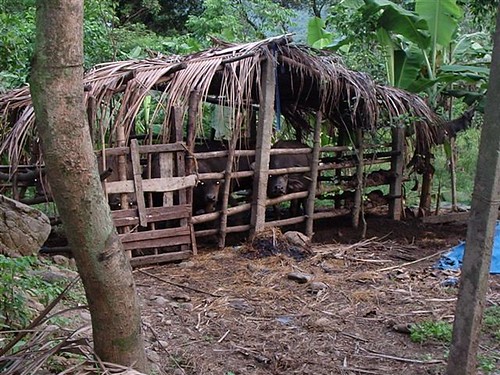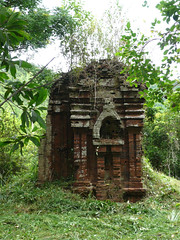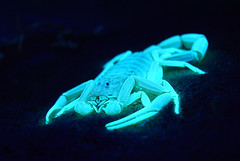After a few days of rest and quiet talk, Ginjo and Gunjar made a decision: they would strike again before returning to Pasar. If they left now, some companions might not return. But there were still at least two bakemono dens they hadn’t touched—and the deeper threat was still out there.
So they set out together—Ginjo, Gunjar, and their surviving
allies. Sukh and Sentra came too, but stayed back as rearguard, setting
up a watching post inside the canyon to guard the main party’s retreat. Or, if
the main party didn’t return, they’d know what to do.
The assault began early, on a cave lay high on the southern
cliffs. Inside, they met a strange and fearsome group of bakemono: lean and
long-limbed, with faces like mangy cats or clever, hungry dogs. Their weapons
were long spears with cruel barbs. Their laughter echoed off the walls—manic
and mocking—and they fought as if indifferent as to whether it was them or
their enemies who died.
The heroes surprised a group during a meal. Gunjar called
down divine silence, and within moments the creatures were overwhelmed, tied
up, and disarmed. The party crept past a sleeping chamber—rows of skeletal
bakemono sprawled on mats—and burst into their chief’s hall.
The fight was fierce. The chief and his bodyguards fought
with wild, high-pitched howls. Ginjo took a wound to the side. One of the monks
nearly lost his arm. But when the chief fell, the others surrendered. Again,
Gunjar insisted that these monsters should be allowed to surrender; the party
bound them and began to regroup.
That’s when they heard the knocking.
From behind a wooden door came the noise—bakemono calling
out, knocking, not hostile but persistent in claiming they needed to present an
offering to the chief. Gunjar wanted to rest, to heal the injured. But the
knocking continued, louder and louder. The party decided to ignore them, wait
for silence, then make a break for the exit.
They followed this plan—but it soon fell apart.
They silently left the chief’s chamber and then crept
through the hallway toward the entrance—and into an ambush. A group of bakemono
with bows and crossbows stepped out of hidden alcoves and opened fire.
At the same time, a squad of spear-wielders charged from a side room.
Ginjo rushed the archers. Gunjar blocked the charge.
Both leaders held the line—but the hallway was narrow and
chaotic. A few bakemono slipped past them and reached the center of the party.
Then came salvation.
Sentra and Sukh, sensing the delay, had entered the
cave. They found the bakemono bowmen from behind, cut one down, and shouted to
draw the rest. It worked. Ginjo seized the moment, rallying the others. “Move!”
he shouted. “Get to the exit!”
They ran.
Sid, one of the monks, was caught in the flank and
gored by a spear. He went down, bleeding out fast. Gunjar turned back, drove
the bakemono off with a furious strike of his staff, and knelt beside his
friend. His hands glowed gold. Sid stirred. He lived.
Gunjar pulled Sid to his feet and shoved him toward the exit,
and stood before the final wave— three gaunt and slavering bakemono with axes
and long spears. They saw Gunjar alone and wounded, and they struck. He stood
his ground. He fell under them.
Ginjo led the retreat, fighting through the last bakemono to
reach the mouth of the cave and usher the others out, with Sukh bringing up the
rear. The canyon air hit them like wind on fire. As soon as they reached the
air, the always unpredictable Sentra was gone—vanishing alone into the hills. “Let
him go,” Irak, said, “the two-fold path always returns and if we stays on it,
that’s where we will meet him.”
They regrouped at the base of the cliffs. Everyone had
wounds. Some could barely walk.
Sukh looked around, then said, “Gunjar… I used to think he
was just odd. But he never hurt anyone. He always walked toward danger. And now
he's gone.”
He sheathed his blades. “Let’s get back to camp.”
The Jungle Trial
That was easier said than done. Gunjar had known the trails
best. Sukh led them up and over the ridge, but they ended up in a swamp.
They turned around, cut their way through a thicket, and found themselves in
deep forest as the sun began to set.
They pushed on. Swords and parangs cut through hanging
vines. Then Arif, one of the quiet monks, cried out—his sword caught on
a strange, glossy vine. He tried to free it. The vine pulled back. Sticky.
Elastic. Not a vine.
ched him. His friends cut it down, drove the other off. But Arif was shaking. The poison took him before they could stop it.
They didn’t find their old camp. Instead, they made a new
one: a bare clearing beneath the stars. No fires. No tents. Some slept. Some
just waited for dawn.
Return to Pasar
The next day, they followed the Rowche Valley trail
and returned to Pasar.
Howzaa, last of the farmers, spoke first. “I’ll guard
my village,” he said. “But I’m done with these caves. You’re welcome in my
home, any time. But I won’t go back.”
The monks split.
- Bagus
and Cahya were blunt. Ginjo was brave, but reckless. He chased glory,
not balance. They were done.
- Sid,
the one Gunjar had saved, quietly joined Sukh. “I don’t know why
Gunjar fought the bakemono,” he said. “But I trust him. And if you’re
going back, I will too.”
- Irak,
a soft-spoken but fierce monk, pulled Ginjo aside. “There’s something
darker in that canyon,” she said. “The others don’t see it. But I do. I
believe in you.”
Sheng and Shek, the mercenaries, were loyal. Ginjo
had saved them. And the Silk Guild still paid well. “Better than guarding
caravans,” Shek grunted.
Ginjo and Sukh looked at what was left. They could lead this
group. But they needed more than fighters.
They needed a mystic.
That’s when they met Pana.
A stranger from the west, he wore rough robes over fine
armor. He was from the west, but did not adhere to the One Law, instead claiming
to carry secret wisdom. Two silent acolytes followed him. He listened to
Ginjo’s tale, nodded once, and smiled.
“I have seen mysteries that you may never see,” Pana said.
“But I know evil when I see it. I’ve seen things like your bakemono before. Sometimes
killing is the answer.”
And so he joined them.




















